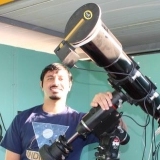INDI Library v2.0.7 is Released (01 Apr 2024)
Bi-monthly release with minor bug fixes and improvements
No ASI Camera after Update - Suspect port mapping
- Radek Kaczorek
-

- Offline
- Moderator
-

- Posts: 983
- Thank you received: 375
Replied by Radek Kaczorek on topic No ASI Camera after Update - Suspect port mapping
Please Log in or Create an account to join the conversation.
- Kevin Ross
-

- Offline
- Elite Member
-

- Posts: 421
- Thank you received: 102
Replied by Kevin Ross on topic No ASI Camera after Update - Suspect port mapping
Yes, x64. Debian with prebuilt kernels, as well as custom built kernels, trying to get the exact same kernel version as what's used on the Pi.
When I was going through this exercise, I compared the ftdi_sio.c driver file, and noticed no difference of importance. There are differences, because it seems the Raspberry Pi kernel might be cherry picking changes from newer kernels. Not sure though.
Please Log in or Create an account to join the conversation.
Replied by Spartacus on topic No ASI Camera after Update - Suspect port mapping
I have just run into this problem. Camera tabs come up in indi but will not connect. I usually do a nightly build update every few days so this was all working last weekend. I am running an Odroid XU4 (running Ubuntu Mate 18.04) with a powered USB3 hub (motor focus and dew heater electronics all in one box so do not have access to the odroid based USB ports only the hub. I am able to connect to the cameras using PhD2 and loop images from both cameras so this would suggest that the problem is with EKOS/indi.
I tried to roll back to the last stable version and encountered some errors and appear to be stuck on 3.5 beta, although I will keep trying but thought that I would post in case there is a quick fix
Are there any work arounds currently for non Rpi single board computers?
Cheers,
Mike
Please Log in or Create an account to join the conversation.
- Rishi Garrod
-

- Offline
- Elite Member
-

- Posts: 245
- Thank you received: 56
Replied by Rishi Garrod on topic No ASI Camera after Update - Suspect port mapping
sudo rpi-update e1050e94821a70b2e4c72b318d6c6c968552e9a2
Worked perfectly for me.
Please Log in or Create an account to join the conversation.
Replied by Avocette on topic No ASI Camera after Update - Suspect port mapping
Please Log in or Create an account to join the conversation.
Replied by Spartacus on topic No ASI Camera after Update - Suspect port mapping
Sorry I should have said that I had tried everything suggested in the post with no effect. I think that there are differences in the Ubuntu OS on the Odroid XU4. It did not recognised the rpi-update (not a Pi I suppose
I appreciate any advice though.
Mike
Please Log in or Create an account to join the conversation.
Replied by Spartacus on topic No ASI Camera after Update - Suspect port mapping
This is all a bit curious.
I wound back to the last stable version last night only to find that this is now the 3.5.0 beta. So I will have to find some other way of rolling back further.
Debug suggests that both my ASI294MCpro and ASI120MM-S are being recognised but the indi gui only has three tabs and no connection options. Connect and disconnect on the main tab do nothing.
PHD2 running in the same system picks up the cameras OK so there does not appear to be an issue with the USB etc. I am no expert but this has happened since the last nightly build. Hopefully if I can find a stable version before 3.5.0 I should be able to get back up and running.
Anyway I have a alternative testing framework with a RPi4 running Ubuntu 20.04 which I updated a couple of days ago but did not test.
Oh well the weather is very overcast for this weekend so no prospect of getting the gear outside.
If I find a solution I will post.
Cheers,
Mike
Please Log in or Create an account to join the conversation.
- Bernd Limburg
-

- Offline
- Premium Member
-

- Posts: 145
- Thank you received: 15
Replied by Bernd Limburg on topic No ASI Camera after Update - Suspect port mapping
Please Log in or Create an account to join the conversation.
Replied by Spartacus on topic No ASI Camera after Update - Suspect port mapping
This just gets more interesting. Unfortunately I have been testing without an EQMod Direct (telescope simulator) as well as the EQmod and the same result so that is not going to work for me.
I spent yesterday installing Ubuntu 20.04 (another interesting experience in the Odroid XU4) with the same result.
I am going to pull the Odroid and use the RPi4 and see how that goes as most people on this forum seem to be finding workarounds with RPi4 but none of these appear to work with the Odroid. Thanks for the advice though.
Rainy weather here so I am not missing out on any clear sky time
Mike
Please Log in or Create an account to join the conversation.
Replied by Spartacus on topic No ASI Camera after Update - Suspect port mapping
Thought I would give an update. After trying Ubuntu 20.04 (ASI indi drivers not loading) with same result then reverting back to 18.04 and reconfiguring from scratch I ended up with even worse problems with the indi drivers all crashing on start up of any indi profile with live equipment attached. So I figured it's curtains for the Odroid and will be using RPI4 (ordered an 8gig version) from now on.
In the meantime, using a spare RPi4 running Ubuntu 20.04, I am still having some issues with using a USB3 hub. Everything connects with no crashes on the stable version of KStars but the ASI294MCpro hangs on capture. The ASI120 attached to the 294 hub captures OK and both cameras will capture using phd2.
I just tried the nightly build but that crashes on load up of the ASI drivers.
I note that the work around to roll back the kernel has worked for Raspian users but the command is not recognised in ubuntu. Are there any similar quick fixes for ubuntu users to roll back the kernel?
Cheers,
Mike
Please Log in or Create an account to join the conversation.
Replied by Spartacus on topic No ASI Camera after Update - Suspect port mapping
So just to reiterate I am using a Rpi4 4Gig running ubuntu 20.04. I am using a powered 7 port USB3 hub. Everything now is plugged into the hub (ASI 294MCpro (+ASI120MM-s) also NEQ6Pro mount using a EQdir serial to USB connector, plus arduino motor focuser and portable HD) with nothing apart from the hub plugged into the Pi and everything connects and works as expected.
However the crashing of the ASI drivers on the current nightly build is still occurring so I will stick to the stable version for the time being.
Mike
Please Log in or Create an account to join the conversation.
- Jasem Mutlaq
-

- Online
- Administrator
-

Replied by Jasem Mutlaq on topic No ASI Camera after Update - Suspect port mapping
For StellarMate users, run this:
sudo apt-get update && sudo apt-get -y dist-upgradeIf you want to try it out, edit /lib/udev/rules/60-rpi.gpio-common.rules:
SUBSYSTEM=="bcm2835-gpiomem", KERNEL=="gpiomem", GROUP="dialout", MODE="0660"
SUBSYSTEM=="gpio", KERNEL=="gpiochip*", ACTION=="add", PROGRAM="/bin/sh -c 'chown root:dialout /sys/class/gpio/export /sys/class/gpio/unexport ; chmod 220 /sys/class/gpio/export /sys/class/gpio/unexport'"
SUBSYSTEM=="gpio", KERNEL=="gpio*", ACTION=="add", PROGRAM="/bin/sh -c 'chown root:dialout /sys/%p/active_low /sys/%p/direction /sys/%p/edge /sys/%p/value ; chmod 660 /sys/%p/active_low /sys/%p/direction /sys/%p/edge /sys/%p/value'"Then reboot and try it out. Please confirm if this fixes the issue.
Please Log in or Create an account to join the conversation.
